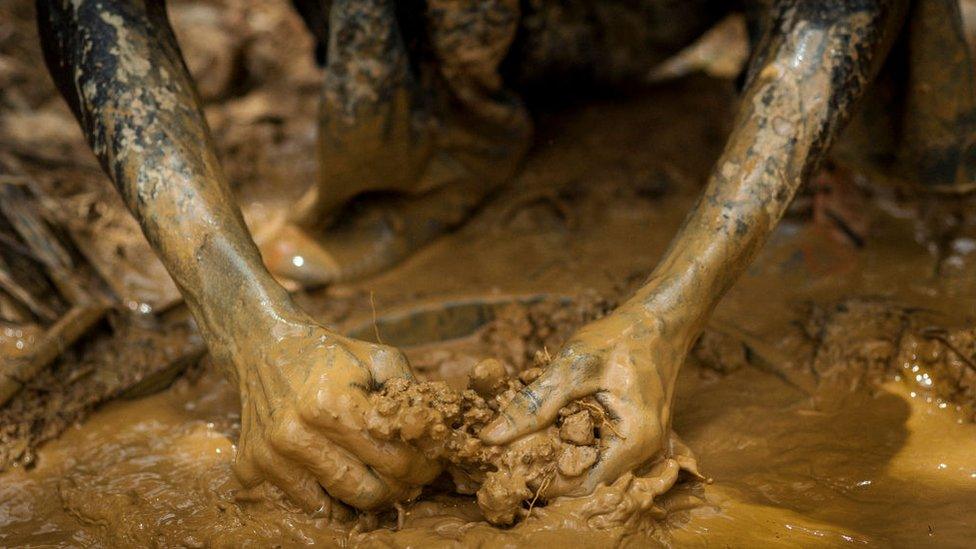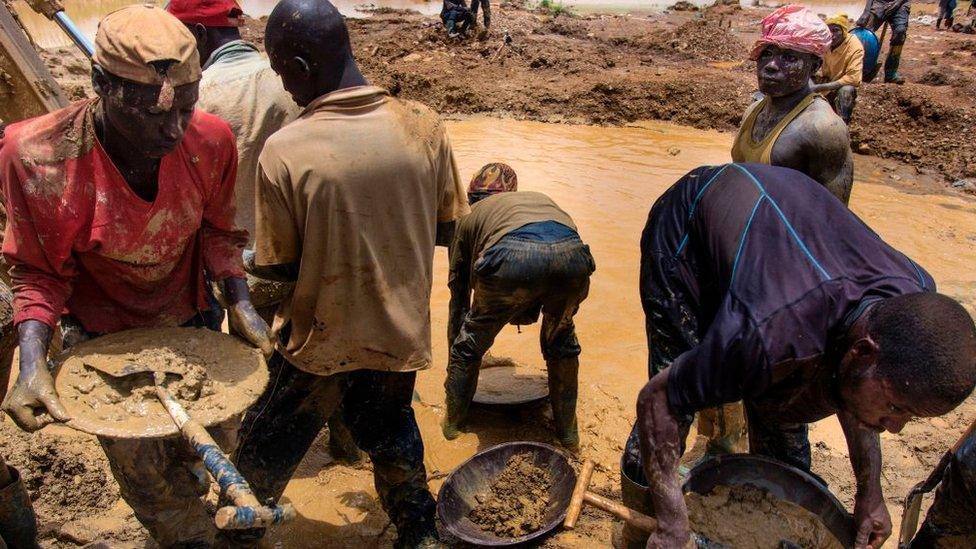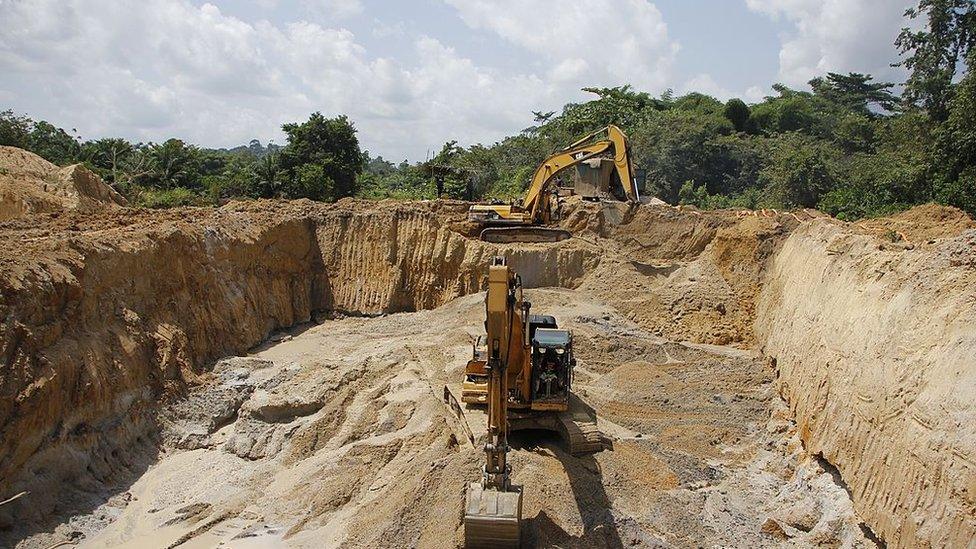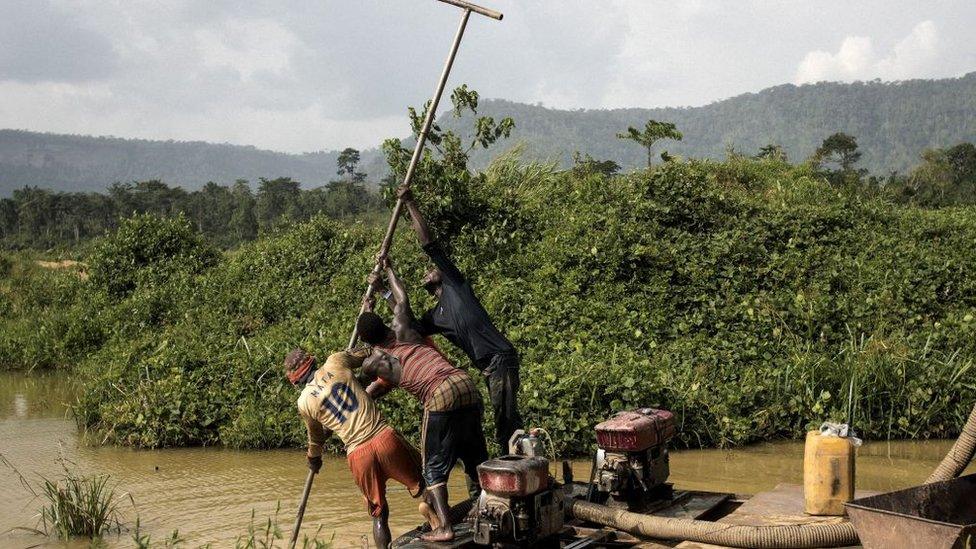Letter from Africa: Why a new word in Ghana spells trouble
- Published

"Galamsey" is apparently a corruption of "gather and sell"
In our series of letters from African journalists, veteran Ghanaian journalist Elizabeth Ohene explains why the notoriety of a new word spells problems for the nation.
Every time we create a new word to describe a phenomenon here in Ghana, you can be sure we are in trouble. The newly popular word, "galamsey", is not exactly new but it was not a word in everyday use either.
Today it is a word that dominates everything; newspapers, the radio, television and every conversation.
A war has been declared against "galamsey". People have been demonstrating against "galamsey". There is of course #SayNoToGalamsey.
But what does "galamsey" mean?
It means the illegal small-scale mining of gold. It also means moonlighting, but that is another story.
Golden stool
The word, as I understand it, has been in use since the first English-speakers became involved in mining the huge gold deposits in what is now Ghana.
The word entered our lexicon in the 1920s when the first laws about gold mining were made during the colonial period.

Ghana has a long history of gold mining
"Galamsey", apparently is a corruption of "gather and sell", which was the description of the traditional method of mining for gold made by the first foreign big-scale miners.
The country of my birth, Ghana, used to be known as Gold Coast, and for a good reason - there is a lot of gold in the bowels of our land.
Indeed often, you need not go all the way into the bowels of the earth, the gold can be found just beneath the surface.
For centuries, we dug for gold and the mineral features in all of our cultural activities. The king of the Asantes sits on a solid golden stool.
No self-respecting young man can get married without giving a set of gold jewellery to his bride.
But the digging for gold was an activity undertaken by few people and there were strict rules about the care of the environment. Rivers were sacred and you treated them with respect.
High-tech
Anybody who follows the news in Ghana would know that we have a full-scale crisis on our hands as a result of "galamsey".
It is no longer "small-scale" - the digging is no longer done with pickaxes and hoes and we no longer wash the dug-up earth and river sediments with the water from the rivers to get gold.

Ghana also has an industrial-scale gold mining sector
There has also been an influx of foreigners who have changed "galamsey" from the one-time romantic activity to a frighteningly brutal undertaking.
"Galamseyers", as I have heard them called, now have armed guards and do not hesitate to use guns when threatened.
We have gone high-tech and graduated to earth-moving equipment and use arsenic and mercury to get the gold.
The result is that almost all our water bodies have been polluted and our forests have been denuded.
Someone suggested that we might run out of safe water by 2030 if things continue as they are currently.
Almost all our rivers have gone a funny colour and the water company is struggling with the purification systems as the waters are alarmingly polluted.
Holding their nerve
Suddenly there is widespread panic and everybody is publicly against "galamsey".
It probably has something to do with the arrival of a new government that is displaying the will to do something about the problem.
The new Minister of Lands and Mineral Resources, John-Peter Amewu, is out there touring the sites and has put a ban on all small-scale mining activity, with or without licences.

The rivers have gone a funny colour
Some very powerful and wealthy people find themselves under unaccustomed pressure and there are open threats that the government will be punished at the next election if the war against "galamsey" persists.
So far, President Nana Akufo-Addo and Mr Amewu are holding their nerve and the rest of us are holding our breaths while cheering them on.
And then there was 'kalabule'
The last time there was such a public outcry against something in Ghana that I remember was in the 1970s and again we found a special word for it.
Back then the word that came into popular use was "kalabule".

Elizabeth Ohene:

I am praying that the current war against "galamsey" succeeds and we reclaim our lands, water bodies and forests

It was an all-purpose word that covered everything that was wrong with our lives then. It was a noun, as in: "She was engaged in 'kalabule'", it was an adjective, as in: "You are a 'kalabule' man", and it was an interjection, as in: "Oh 'kalabule'!"
"Kalabule" meant fraud, it meant trying to make excessive profits, and it meant using political clout to gain unfair advantage. Market women were said to be engaged in "kalabule", and generally seen as villains as they were accused of hoarding goods to create artificial shortages to make excessive profits.
Eventually, a violent military coup d'état was staged to get rid of "kalabule". The most popular market in the city was blown into smithereens to get rid of "kalabule", and top government officials were executed for being "kalabule kings".
I am not quite sure when the word "kalabule" disappeared from the Ghanaian lexicon, but it is a word that many young people would not even understand today, let alone use in conversation.
I am praying that the current war against "galamsey" succeeds and we reclaim our lands, water bodies and forests.
Otherwise, when the next generation moves on to find another word to describe another phenomenon, the Ghana they would be living in would be a desert and they might be importing water to drink.
There probably would be no gold then and there would be no need for "galamsey".

More from Elizabeth Ohene:

Follow us on Twitter @BBCAfrica, external, on Facebook at BBC Africa, external, on Instagram at bbcafrica, external or email africalive@bbc.co.uk , external